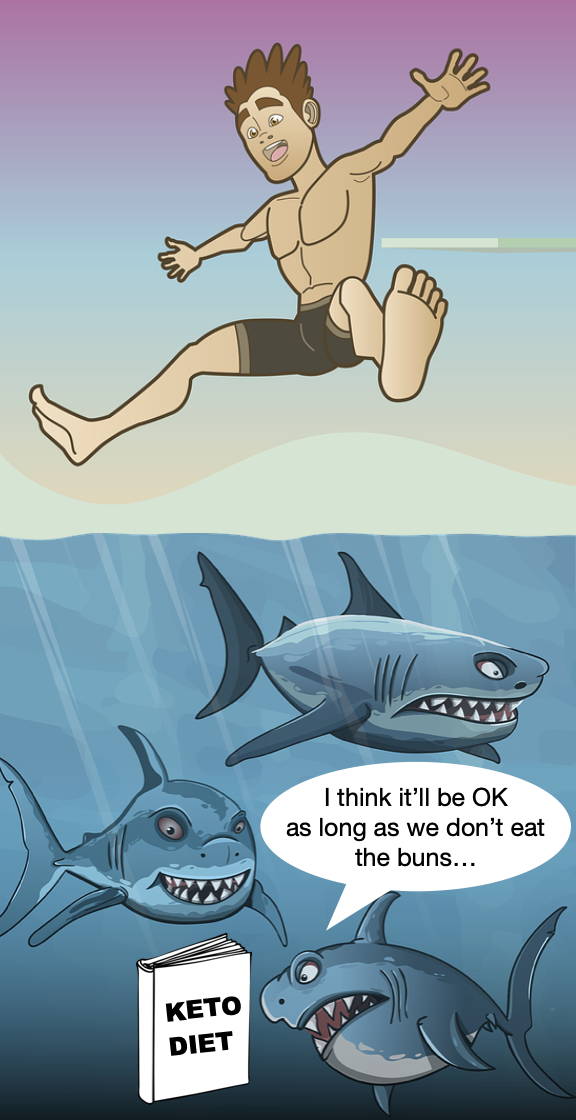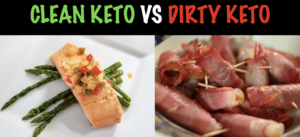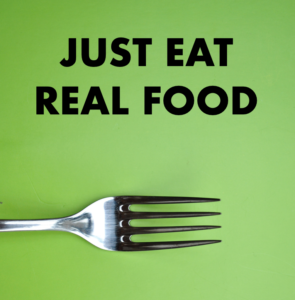 They say their sugar cravings are gone.
They say their sugar cravings are gone.
They say their “brain fog” is gone.
They are losing 3-5 pounds per week.
It’s all because they are “going keto.”
Is it all really too good to be true? Are there health risks to “going keto”, and how do the benefits and risks compare to simply eating REAL food?
We wanted to dive into this topic and help you with the pros and cons of the ketogenic diet.
What is “Keto”?
The ketogenic diet is a very high fat, low carb eating plan. People give up EVERYTHING sweet and starchy. You got it — this means no cake, candy, cookies, soda, juice, sweet tea, lemonade, pizza, pasta, rice, potatoes, corn, popcorn, chips, bread, sandwiches, crackers, most fruit, sweet dressings, even ketchup! Instead, you replace it with lots of nuts, avocados, oils, butter and ghee, along with modest meat, chicken, pork or fish, and a few fruits and vegetables (not too many, because they have carbs).
 And, by following this extremely low carb, high fat diet perfectly, your reward is a metabolic state called ketosis, where your body burns fat instead of carbs for fuel. The liver then makes ketones, which are controversially claimed as “the preferred fuel” that clears up “brain fog” while turning you into a “fat-burning machine”. WOW! Sounds amazing, doesn’t it?!
And, by following this extremely low carb, high fat diet perfectly, your reward is a metabolic state called ketosis, where your body burns fat instead of carbs for fuel. The liver then makes ketones, which are controversially claimed as “the preferred fuel” that clears up “brain fog” while turning you into a “fat-burning machine”. WOW! Sounds amazing, doesn’t it?!
And yes, science does show there’s a slight caloric benefit to “being into ketosis.” The calories that are sneaked out of the body unused in our breath and in our sweat total 45 calories per day. Are you thinking…that’s not a lot of benefit for all that dietary deprivation! In fact, watching this video by Dr. Greger as he reviews the science, explains that the ketogenic metabolic advantage has been “falsified.”
HOW and WHY do people lose weight so quickly on the keto diet?
There are two reasons:
- The keto diet is actually a low-calorie diet. Thanks to the “magic promised of extra fat burning with ketosis,” there’s high motivation to “say no” to everything sweet and starchy like you’ve never done before. Eating lots of fat means satiation kicks in so you don’t eat that much. And, any diet analysis shows that a keto dieter is eating an average of 1,400 calories per day. (You can eat all the butter you want, but if you can’t have any bread, how much butter are you really going to eat?)
- Water loss. As in this video, Dr. Greger explains how the diuretic water loss seen almost immediately on the scale, adds to the weight loss excitement that makes the highly depriving keto diet such a “cash cow.”
What is “Dirty Keto” vs “Clean Keto”?
 “Clean keto” is avocados, grass-fed beef, and wild salmon. “Dirty keto” is diet jello, cool whip, and fast food without the bun.
“Clean keto” is avocados, grass-fed beef, and wild salmon. “Dirty keto” is diet jello, cool whip, and fast food without the bun.
These are foods that even keto dieters admit “aren’t good for you” but, since the diet is SO INCREDIBLY RESTRICTIVE, the internet is flooded with these cheat foods for staying in ketosis, which is the key.
Our question is…why follow a diet that makes you want to resort to food that is so bad for you?
What’s the difference between the Keto Diet and the Atkins Diet?
One word…marketing. Doesn’t “keto” sound fresh and new, and surely means you will get a different result?!
Would you call “keto” a high protein diet?
As with Atkins, you’re advised to NOT eat too much protein. Too much protein allows the body to go into gluconeogenesis, (the making of glucose) which kicks a person out of ketosis. Too much protein is also hard on the kidneys. However, a plate of fat is hard to eat, so most people eat too much protein on the keto diet.
Is ketosis safe?
Ketosis in and of itself is thought to be safe. But the nutritional consequences of what is required to be in ketosis is an entirely different story (as you’ll see in the CONS of Keto below).
The PROS of Keto are:
 People understand the dangers of sugars and refined starches like never before. As we have discussed in our coaching tip on sugar, Americans currently eat 1/3 cup too much added sugar EVERY DAY. Therefore, learning to avoid added sugar and say “no thank you” when we are frequently offered birthday cake, candy, and more, is truly a great “muscle” to flex!
People understand the dangers of sugars and refined starches like never before. As we have discussed in our coaching tip on sugar, Americans currently eat 1/3 cup too much added sugar EVERY DAY. Therefore, learning to avoid added sugar and say “no thank you” when we are frequently offered birthday cake, candy, and more, is truly a great “muscle” to flex!- For many keto dieters, they now eat more vegetables, berries and melon than they ever have! Unfortunately, it’s still FAR LESS than what’s recommended, because you are limited in vegetables and fruit in order to maintain ketosis.
- Burning ketones as fuel is a natural appetite suppressant. This further helps you to eat less.
- It’s a black and white “guide rail” that guarantees a low-calorie diet for weight loss. Most people don’t always do well with messages of “moderation” like the Mediterranean Diet. So this extreme diet, with easy to grasp “rules,” seems easy and effective (at least for a while)!
The CONS of Keto are:
 Pales in comparison nutritionally to a REAL-food diet. You might think that a single serving of berries, and two or so servings of vegetables will give you all the antioxidants you need in a day, but since most fats score a zero, and not a single whole-grain is allowed, up to 17 nutrient deficiencies have been noted among keto diets.
Pales in comparison nutritionally to a REAL-food diet. You might think that a single serving of berries, and two or so servings of vegetables will give you all the antioxidants you need in a day, but since most fats score a zero, and not a single whole-grain is allowed, up to 17 nutrient deficiencies have been noted among keto diets.- Detrimental to the gut microbiome. Just as we are learning how incredibly important our gut microbiome is to our health, studies show that as soon as the first 24 hours on a keto diet, the gut microbiome decreases notably. This is because the bacteria in our gut are literally being STARVED because they live on carbohydrates and fiber! (Most Keto dieters eat a maximum of 15 grams of fiber/day when 30 grams are really what are needed.)
- Saturated fat may put your heart and prostate at risk. The keto theory is saturated fat is only atherosclerotic (clogging to the arteries) in the presence of carbohydrates. Even if this theory is true, most people do “ketoish” or keto every 3 days or so, as it’s a high bar to maintain. Carbs happen! Also, numerous studies (see below) have found saturated fat makes prostate cancer more aggressive.
- Detrimental for people with diabetes. Contrary to what many people think, Dr. Greger explains in this video why this diet is particularly bad for people with diabetes.
- The flagrant use of processed meat is a serious risk to the colon. Most people can enjoy a bit of bacon here and there without harm. However….keto dieters eat A LOT of bacon, often multiple times every day. Most keto advocates are aware that bacon isn’t good for you, but it has been said, “take a keto dieter’s bacon away, and they’ll never be able to adhere – the diet is so restrictive.” As we wrote in our processed meat coaching tip, the World Health Organization has declared processed meats “carcinogenic to humans.” Scientists predict that by 2030 colon cancer rates among 20-34 year olds will increase by 90% (and 124% for rectal cancer), with processed meats (and low fiber) to blame.
- Hair loss is a common complaint of keto dieters (most likely from the compromised micronutrients), and ultimately one of the key reasons they end up quitting the diet.
- Too restrictive. People diet alone, but eat as a family. This much restriction is simply not a sustainable lifestyle to enjoy for a lifetime, let alone model for our children. Plus, unfortunately, rebound weight gain is all too common.
So, what’s the bottom line?
Weight loss by any method can improve your numbers and make you feel better in the short term. However, the science isn’t there to show there’s no risk from the keto diet for the heart, prostate, colon, diabetes and microbiome. And, even if you want to take the risk and bet that it’s healthy, it’s a lifestyle that’s extremely tough to sustain long term, or enjoy as a family.
So…what if you hang onto all that is good about keto (ending your sugar cravings and keeping overall carb intake relatively low), and add back the nutrients you need with a few strategically chosen good for you carbs?
You will be eating REAL food!
 REAL food will always be the answer – you can enjoy delicious food, without giving up entire food groups, while seeing your sugar cravings vanish, and feeding your microbiome PERFECTLY. You also lose your cravings for fried foods and anything “processed” (unlike the “dirty keto” dieters).
REAL food will always be the answer – you can enjoy delicious food, without giving up entire food groups, while seeing your sugar cravings vanish, and feeding your microbiome PERFECTLY. You also lose your cravings for fried foods and anything “processed” (unlike the “dirty keto” dieters).
Truth be known, the REAL food lifestyle is actually “low sugar and low carb” (compared to the Standard American Diet) and is achieved without any “counting of your macros,” and your whole family will enjoy and benefit for a lifetime! Even though initial weight loss may not be as rapid (without the water weight loss advantage), studies show, after one year, the weight loss is the same!
Like we talked about in last weeks’ coaching tip, “What’s the Risk to Eating REAL Food?”
There isn’t one.
And the benefits? Too many to count!
References:
¨ Watch all of Dr. Greger’s videos about the ketogenic diet here: https://nutritionfacts.org/?s=keto
¨ Bank IM, Shemie SD, Rosenblatt B, Bernard C, Mackie AS. Sudden cardiac death in association with the ketogenic diet. Pediatr Neurol. 2008;39(6):429-31.
¨ Cândido FG, Valente FX, Grześkowiak ŁM, Moreira APB, Rocha DMUP, Alfenas RCG. Impact of dietary fat on gut microbiota and low-grade systemic inflammation: mechanisms and clinical implications on obesity. Int J Food Sci Nutr. 2018;69(2):125-143.
¨ Brinkworth GD, Noakes M, Clifton PM, Bird AR. Comparative effects of very low-carbohydrate, high-fat and high-carbohydrate, low-fat weight-loss diets on bowel habit and faecal short-chain fatty acids and bacterial populations. Br J Nutr. 2009;101(10):1493-502.
¨ Gabert L, Vors C, Louche-pélissier C, et al. 13C tracer recovery in human stools after digestion of a fat-rich meal labelled with [1,1,1-13C3]tripalmitin and [1,1,1-13C3]triolein. Rapid Commun Mass Spectrom. 2011;25(19):2697-703.
¨ Noto H, Goto A, Tsujimoto T, Noda M. Low-carbohydrate diets and all-cause mortality: a systematic review and meta-analysis of observational studies. PLoS ONE. 2013;8(1):e55030.
¨ Seidelmann SB, Claggett B, Cheng S, et al. Dietary carbohydrate intake and mortality: a prospective cohort study and meta-analysis. Lancet Public Health. 2018;3(9):e419-e428.
¨ Dattilo AM, Kris-etherton PM. Effects of weight reduction on blood lipids and lipoproteins: a meta-analysis. Am J Clin Nutr. 1992;56(2):320-8.
¨ Bueno NB, De melo IS, De oliveira SL, Da rocha ataide T. Very-low-carbohydrate ketogenic diet v. low-fat diet for long-term weight loss: a meta-analysis of randomised controlled trials. Br J Nutr. 2013;110(7):1178-87.
¨ Nicholls SJ, Lundman P, Harmer JA, et al. Consumption of saturated fat impairs the anti-inflammatory properties of high-density lipoproteins and endothelial function. J Am Coll Cardiol. 2006;48(4):715-20.
¨ Phillips SA, Jurva JW, Syed AQ, et al. Benefit of low-fat over low-carbohydrate diet on endothelial health in obesity. Hypertension. 2008;51(2):376-82.
¨ Wibisono C, Rowe N, Beavis E, et al. Ten-year single-center experience of the ketogenic diet: factors influencing efficacy, tolerability, and compliance. J Pediatr. 2015;166(4):1030-6.e1.
 LEARN MORE ABOUT THE NAPKIN!
LEARN MORE ABOUT THE NAPKIN!


This is a great article!! I have told some friends that have questioned whether or not they should do the Keto diet, don’t do it. It’s not healthy and the best way to lose weight is to eat real food! I believe most ‘fad’ diets are unhealthy! Thanks for sharing this information!
Way to go Pam setting your friends straight! I know it’s hard to be “old fashioned”. But if they TRULY understand what and how eating REAL food is…they realize it’s actually cutting edge, for life, and oh so delicious!
Pam – thank you for your ongoing support of eating REAL food! We really appreciate your feedback and so glad you liked this coaching tip – and glad it helps! Thank you!
I’ve had friends who’ve been on keto with great results, but also with some of the side effects mentioned above. I also know a couple who did it and the husband suffered a heart attack after six months; his doctor tied it to the diet. It’s always sounded like a too good to be true kind of deal. I only have one kidney, so any of the extreme diets are pretty much off the table for me (plus my sweet tooth would never cooperate!). Changing my overall eating habits, in my opinion, sounds like a better bet. 🙂
WOW! Thanks for sharing this Michelle. And a REAL Food diet is SOOOOO protective of your one and only kidney! In fact, we’ll have a coaching tip on optimal Real foods for kidney health coming soon. 😉